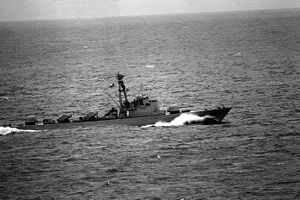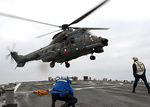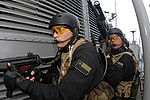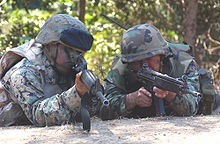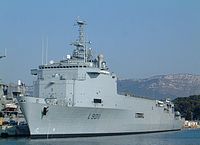- Chilean Navy
-
Chilean Navy
''Armada de Chile''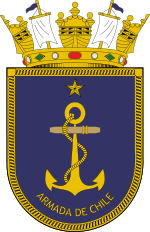
Coat of arms of the Chilean NavyActive 1817-present Country  Chile
ChileSize 71 vessels
25,000 personnelMotto Vencer o Morir
("Conquer or Die")Anniversaries 21 May, Día de las Glorias Navales (Navy Day) Engagements Chilean War of Independence (1810–1826)
Peruvian War of Independence (1811–1824)
War of the Confederation (1836–1839)
Chincha Islands War (1864–1866)
War of the Pacific (1879–1883)
Chilean Civil War (1891)Commanders Current
commanderEdmundo González Robles Notable
commandersLord Thomas Cochrane
Manuel Blanco Encalada
Juan José Latorre
Arturo Prat
Jorge Montt
Juan Williams RebolledoInsignia Naval Ensign[1] 
Naval Jack 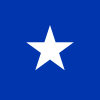
Roundel of Naval Aviation 
The Chilean Navy (Armada de Chile) is the naval force of Chile.
History
Independence Wars of Chile and Peru (1817–1830)
Main article: First Chilean Navy SquadronThe Chilean Navy dates back to 1817. A year before, following the Battle of Chacabuco, General Bernardo O'Higgins prophetically declared "this victory and another hundred shall be of no significance if we do not gain control of the sea".
This led to the development of the Chilean Navy, and the first legal resolutions outlining the organization of the institution were created. Chile's First National Fleet and the Academy for Young Midshipmen (predecessor of the current Naval Academy) were founded, as were the Marine Corps and the Supply Commissary.
The first commander of the Chilean Navy was Manuel Blanco Encalada until Lord Cochrane, formerly a Captain in the British navy, was hired by O'Higgins to be the commander of the Navy, who in turn hired an almost all-anglophone complement of officers and midshipmen, and crews of British, Irish and American seamen. He was a key figure in the war against loyalist forces in Peru. He later took control of the fortresses of Valdivia, but failed in his attempt to conquer Chiloé Island.
In March 1824 the Chilean Navy and Army took again upon the task of eradicate the Spanish monarchy from Chiloé Archipelago. An expedition was disembarked to Chiloé Island which ended in failure when the Chilean Army led by Jorge Beauchef was defeated at the Battle of Mocopulli. Only after Ramón Freire's Chiloé expedition of 1826 did the royalists at Chiloé, led by Antonio de Quintanilla surrender, and Chiloé joined the new Chilean nation.
Age of exploration, territorial expansion and wars (1830–1885)
After the independence wars a series of conflicts consolidated the importance of the Chilean Navy, these conflicts were the War of the Confederation (1836–1839), the Chincha Islands War (1864–1866) and the War of the Pacific (1879–1883). The founding of Fuerte Bulnes in the Strait of Magellan marked the starting point of a series of Chilean Navy explorations, led by navy hydrographers like Francisco Vidal Gormaz and Francisco Hudson, in the unknown zone between the Strait of Magellan and Chiloé. To deal with this new area of activity the navy founded in 1874 the Hydrographic Office whose first director was Francisco Vidal Gormaz.
The Chilean war hero and martyr Arturo Prat is regarded as the ultimate example of the commitment of the Navy to its country, after his death while leading a boarding party onto the enemy ironclad Huáscar at the naval battle of Iquique on 21 May 1879, during the War against Peru and Bolivia. The anniversary of this battle is celebrated every year as a public holiday called Día de las Glorias Navales. Prat is also considered to be one of the co-founders of the Naval Seaman Training School in 1868, which began operating a year later, and was one of the Naval Academy's finest graduate officers that in 1943 it became the National Naval School "Arturo Prat" in his honor.
The Navy further distinguished itself during the Battle of Pisagua in 1879, led by both the Navy and the Marine Artillery Groups and Marine Infantry, the world's first modern military landing operation, that resulted in Chilean victories in other parts of Peru's Tarapaca region, and resulted to its annexation by Chile.
After navy visits to Easter Island in 1875 and 1887 Chilean navy officer Policarpo Toro managed to negotiate an incorporation of the island into Chile with native Rapanui in 1888.
With the Peruvian Navy destroyed, Bolivia becoming a landlocked country and Argentina having only a brown-water navy the Chilean Navy had a regional hegemony in the years following the War of the Pacific. To secure this advantage and not letting new Argentine acquisitions challenge Chilean Naval power the Chilean government decided to modernize its navy. The modernization plan included the ordering of two cruisers, two torpedo boat destroyers and the modernization of two armoured ships in English docks.
Civil war and arms race (1885–1915)
See also: South American dreadnought raceChilean Navy ship purchases and orders from 1887 to 1912 Year Ships Builder 1887 2 Central battery ironclads
2 torpedo boats1891 Chilean Civil War 1892 1 Cruiser 1895 1 Cruiser Mitchell & Co 1896 1 Armoured cruiser
6 torpedo boatsArmstrong Whitworth 1902 2 Pre-dreadnought battleships 1902 arms control treaty with Argentina 1911 1 Dreadnought battleship Armstrong Whitworth 1912 1 Dreadnought battleship Armstrong Whitworth The advent of the Chilean Civil War of 1891 saw a breach between the two branches of the Chilean Armed forces, while the bulk of navy sided the congress side the majority of the Chilean Army remained loyal to José Manuel Balmaceda. When the majority of the national congress broke relations with the government Jorge Montt took control of the fleet at Valparaíso and with notable politicians, like Ramón Barros Luco, on board the fleet sailed north to the nitrate-rich Tarapacá area which Chile had seized from Peru ten years earlier. Tarapacá was by that time Chile's richest region in terms of natural resources and was without the fleet practically out of reach for the Chilean Army. From here the navy organized an army made of nitrate miners which they armed and trained to face the 40,000-men strong Army of Chile. On August 1891 the new army was disembarked in Quintero and defeated the Chilean Army at the Battle of Concón and the Battle of Placilla before the presidential faction disbanded and the congressional side took power. On the elections of October 1891 Jorge Montt was elected president.
Not all navy officers sided with the congress. Some like Juan Williams Rebolledo, Juan José Latorre and Policarpo Toro remained on the presidential side and Francisco Vidal Gormaz declared his neutrality. After the war these officers were removed from their offices. In contrast to these officers whose career or influence in the navy was truncated by the war, the Chilean Civil War served as a starting point of a successful career in the navy for a generation of young officers like Francisco Nef and others who sided with the congressionals who won the war.
After incidents with Chile in 1872, 1877 and 1878 Argentina had decided that a brownwater navy, even if modern, was not enough to back up its ambitions in Patagonia and the South Atlantic. Both countries were distracted in the next few years by Argentina's internal military operations against natives and Chile's War of the Pacific against Bolivia and Peru, but by 1890 a full-fledged naval arms race was underway between the two.[2][3] The Boundary treaty of 1881 between Chile and Argentina had been a major success in laying the groundwork for nearly all of Chile's and Argentina's 5600 km of shared borders, but the drawing a boundaries in the largely unexplored inland Patagonia soon became a major source of territorial disputes. Over the 1880s and 1890s Chile and Argentina engaged in an arms race fueled by nationalistic rhetoric and tax income from their blooming economies. Both countries signed a treaty in 1902 to end the arms race. However, in 1904 Brazil ordered two Minas Geraes-class dreadnoughts to be built by the United Kingdom.[4] In response, Argentina ordered two Rivadavia-class dreadnoughts with an option for a third from the United States. They also ordered twelve destroyers from three nations in Europe. With its major rival acquiring so many modern vessels,[N 1] Chile was forced to respond, though this was delayed by a financial depression brought on by a drastic fall in the nitrate market and a major earthquake in 1907 and 1908, respectively.[6]
During the 1890s the Chilean Navy carried out many hydrographic surveys in the Patagonian channels aimed to improve navigation and explore the river basins of Patagonia. A German geoprapher, Hans Steffen, led navy explorations to western Patagonia, laying the groundwork for colonization of what would be Aisén Region years later. The Navy occasionally collaborated with European naturalists such as Carl Skottsberg in their surveys of Chilean territory.
Depression, mutiny and political turmoils (1915–1950)
 The Chilean Air Force bombs the Chilean Fleet at the port of Coquimbo during the Chilean naval mutiny of 1931.
The Chilean Air Force bombs the Chilean Fleet at the port of Coquimbo during the Chilean naval mutiny of 1931.
In 1931 the navy once more made headlines in Chilean politics when large portions of it (26 ships) begun a mutiny that demanded the president to rescind a salary reduction. The demands were later expanded to include an agrarian reform, industrial "solidarity" and the payment of the external debt by the "millionaires". The mutineers had their ships located at Coquimbo and Talcahuano's naval base which they controlled. Chilean government responded by sending the Chilean Air Force to bombard the ships in Coquimbo and charging Talcahuano's naval base. After the quelling of the rebellion the navy was purged, although the mutiny had its origin among the lower ranks.
Chile formulated its Antarctic claim in 1940 and in 1947 the navy established the first Chilean base, Captain Arturo Prat Base, in the continent before the Chilean Army or Airforce established their own bases. Since then the navy has played a major role in supplying Chilean bases and performing numerous rescue missions among them of MS Explorer in 1972 and 2007.
The Navy's sailing school ship, the Buque Escuela Esmeralda, began operations in 1952. It since has made various trips around the world, with cadet officers and NCO's on board trained in ship handling and operations.
Beginning in the 1950s the Chilean Navy began to be involved in a series of incidents with the Argentine Navy and Argentine civilians in the disputed area of Beagle Channel and Cape Horn. This incidents took both form of incursions into Chilean waters by Argentine fishing ships and provocations such the shelling of a Chilean lighthouse by the Argentine Navy during the Snipe incident of 1958. During the critical phases of the Beagle conflict of the late 1970s the Chilean Navy played a decisive role in defending Chilean sovereignty over Picton, Lennox and Nueva islands that the Argentine Navy planned to seize. While Argentina aborted its invasion plan, Operation Soberanía in December 1978, Argentina went rather into war with the United Kingdom in the Falklands just after 4 years. During that conflict the Chilean Navy provided diversion to favour the British, as it was understood that if Argentina won the war they would once again try to seize Picton, Lennox and Nueva and Cape Horn.
1964 would see the birth of the modern Chilean Navy Marine Corps of today.
Naval educational institutions were reformed in 1968 when president Eduardo Frei Montalva created the Naval Specialities Schools System with headquarters in Las Salinas Naval Base in Viña del Mar. One of its schools, the Naval Seaman Training School, became the Seamen's School of the Navy "Captain Alejandro Navarrete Cisterna" on the same year as its centenary, in honor of the first naval seaman to rise through the ranks to become a naval officer. The NSSS soon became the Naval Polytechnic Academy in 1995, through a merger of all its component schools, some of these schools staying as independent constituent academies.
After the 1973 Chilean coup d'etat together with the Army, the Air Force and the Carabiniers, the Navy, led by Admiral Jose Toribio Merino became part of the Government Junta led by Army commander in chief Augusto Pinochet, and upon the latter's resignation from the Junta leadership in 1981, Adm. Merino became its chairman until March 1990, presiding over its sessions and those of the Legislative Commission, and was also concurrently the National Defense Minister. The training ship Esmeralda (BE-43) functioned as a floating prison and tortute chamber for political prisoners during the 1973-1980 period of the military dictatoship.[7] It is claimed that probably over a hundred persons were kept there at times and subjected to hideous treatment.[8][9] It was also an unprecedented period of growth and expansion of the naval service as more vessels became part of it, the Marines strengthed and the Navy's special forces unit raised.
Present
The 25,000-person navy, including 5,200 Marines, is directed by Admiral Edmundo Gonzalez. Of the fleet of sixty-six surface vessels (soon to be increased to seventy-four),[citation needed] twenty-one are major combatant ships based in Valparaíso. The navy operates its own aircraft for transport and patrol; there are no fighter or bomber aircraft. The Navy also operates four submarines and a tender ship to support them, all based in Talcahuano. The Navy permits the integration of Chile's Pacific and Southern island regions, thus integrating its disjointed geography. The transport of passengers, especially during the school year or in cases of emergency, together with the supply of provisions and fuel, are of key importance to the inhabitants of these insular zones.
The Chilean Navy is generally considered to be among the most capable and professional in the Americas and is heavily aligned with significant naval powers such as the United States Navy and several European navies, most notably the British Royal Navy.
The institution regularly carries out civil operations whereby Navy professionals provide social assistance and health care to the civilian population, and provide support in cases of natural catastrophe.
It also undertakes preventative education campaigns for Chile's population on issues that include security on beaches and seaside resorts and measures to be taken in the case of a tsunami.
The most important naval bases and supply depots are (from north to south) in the Pacific Ocean: Iquique, Easter Island, Valparaíso, Talcahuano, Puerto Montt, in the Atlantic zone: Strait of Magellan: Punta Arenas, in the Beagle Channel: Puerto Williams, and in Antarctica: Captain Arturo Prat Base. These are now spread into 5 Naval Zones: the 1st, 2nd, 3rd, 4th, and 5th Naval Zones.
Wars
The Chilean Navy has been an important component in all international wars fought by Chile, since the Andes and the Atacama desert makes natural barriers difficult to cross. The Chilean Navy has fought the following wars:
- Chilean War of Independence against Spain commanded by Lord Cochrane (1810–1826)
- War of the Confederation against the Peru-Bolivian Confederation (1836–1839)
- Chincha Islands War against Spain (allied with Bolivia, Ecuador and Peru) (1864–1866)
- War of the Pacific against Bolivia and Peru. (1879–1883)
- Chilean Civil War (1891)
In addition the navy have been involved in the following conflicts:
- Occupation of Araucanía (1861–1883)
- Incidents with Argentina in 1872, 1877 and 1878.
- Chilean naval mutiny (1931)
- Beagle conflict (1950s–1984)
- Chilean coup d'état against the UP government (1973)
Ships
Type vessel source mission photos notes frigate Type 23 frigate (FFG-05) Almirante Cochrane ex-HMS Norfolk
(FF-07) Almirante Lynch ex-HMS Grafton
(FF-06) Almirante Condell ex HMS Marlborough United Kingdom
United KingdomAnti-submarine warfare 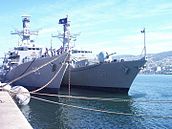
Type 22 frigate (FF-19) Almirante Williams ex-HMS Sheffield  United Kingdom
United Kingdommultipurpose 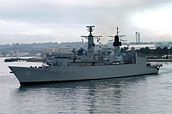
ASMAR modernized in Talcahuano with the addition of an OTO Melara 76mm gun, missiles and Harpoon radars. L class frigate (FFG-14) Almirante Latorre
(FFG-11) Capitán Prat Netherlands
NetherlandsAnti-aircraft warfare 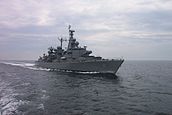
M class frigate (FF-15) Almirante Blanco Encalada
(FF-18) Almirante Riveros Netherlands
Netherlandsmultipurpose Anti-submarine warfare 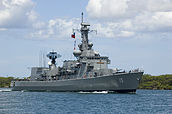
Submarine Attack Scorpène class submarine (SS-23) General O'Higgins
(SS-22) General Carrera Spain
Spain
 France
Francesubmarine 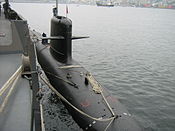
Type 209 submarine (SS-20) Comandante Thomson
(SS-21)Capitán Simpson Germany
Germanysubmarine 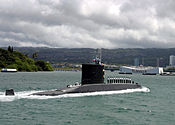
updated in 2009 in Asmara, among the improvements include the ability to launch Exocet missiles. Fast Attack Craft Tiger class fast attack craft (LM-39) Teniente Uribe
(LM-37) Teniente Orella
(LM-36) Guardamarina Riquelme
(LM-38) Teniente Serrano Germany
GermanyFast Attack Craft 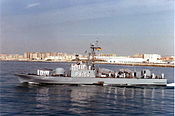
Sa'ar 4 class missile boat (LM-32) Chipana
(LM-31) Casma
(LM-34) Angamos Israel
IsraelMissile boat 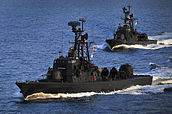
Underway replenishment Henry J. Kaiser class oiler (AO-52) Almirante Montt
AO-53 Araucano United States
United StatesUnderway replenishment 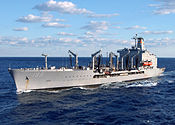
Patrol boat Class Patrol Boats Grumete (LPC-1814) Díaz
(LPC-1815) Bolados
(LPC-1816) Salinas
(LPC-1817) Téllez
(LPC-1818) Bravo
(LPC-1820) Machado
(LPC-1822) Troncoso
(LPC-1823) Hudson United States
United StatesPatrol boat 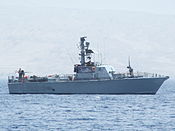
Minor features vessels distributed in the 5 naval zones are:
boat Name Patrulleros de Zona Marítima PZM (OPV-81) Piloto Pardo, (OPV-82) Comandante Toro Submarine tender (BMS-42) Almirante Merino. Barge Class "Batral" (LST-95) Chacabuco y (LST-92) Rancagua Barge Class "Elicura" (LSM-90) Elicura, (LSM-94) Orompello Personnel and cargo transport (AP-41) Aquiles Rescue vessel (BRS-63) Ingeniero Slight Icebreaker (AP-46) Almirante Oscar Viel Hydrographic patrol: Corneta Cabrales Tugboat (ATF-66) Galvarino, (ATF-67) Lautaro Class Patrolman "Protector" (Coast Guard) (LSG-1603) Alacalufe, (LSG-1604) Hallef, (LSG-1609) Aysén, (LSG-1610) Corral, (LSG-1611) Concepción, (LSG-1612) Caldera, (LSG-1613) San Antonio, (LSG-1614) Antofagasta, (LSG-1615) Arica, (LSG-1616) Coquimbo, (LSG-1617) Puerto Natales, (LSG-1618) Valparaíso, (LSG-1619) Punta Arenas, (LSG-1620) Talcahuano, (LSG-1621) Quintero, (LSG-1622) Chiloe, (LSG-1623) Puerto Montt, (LSG-1624) Iquique Patrullero Clase "Taitao" (PSG-71) Micalvi, (PSG-72) Ortiz, (PSG-73) Isaza, (PSG-78) Sibbald, (PSH-77) Cabrales, (PMD-74) Cirujano Videla Patrol boats 20 Class Patrol Boats "Arcangel" and 15 Class Patrol Boats "Defender" Minor patrol boat 35 boats 2 patrol boats Yagán y Ona 1 Historical relic Monitor Huáscar Aircraft inventory
Aircraft Origin Type Versions In service[10] Notes Bell 206 JetRanger  United States
United StatesUtility helicopter Model 206B
TH-57 Sea Ranger4
2CASA C-212 Aviocar  Spain
SpainTactical transport C-212A 3 Cessna O-2 Skymaster  United States
United StatesLiaison O-2A 8 Embraer EMB-111  Brazil
BrazilMaritime patrol aircraft
transportEMB-111AN
EMB-111C3
1Eurocopter Bo 105  European Union
European UnionUtility helicopter Bo 105C 2 Eurocopter AS 532 Cougar  European Union
European UnionNaval helicopter AS 532SC 5 1 lost in night-time ASW
training accidentEurocopter AS 365 Dauphin  European Union
European UnionSAR helicopter AS 365 8 4 former Irish Air Corps CASA C-295  Spain
SpainMaritime patrol aircraft C-295 MPA C-295 ASW
1 2
1 MPA, 2 ASW with option for (5+) MPA or ASW Lockheed P-3 Orion  United States
United StatesMaritime patrol aircraft
VIP transportP-3ACH 4 (+ 4 spares)
To be replaced by C-295
in the near futurePilatus PC-7 Turbo Trainer  Switzerland
SwitzerlandTrainer 7 Originally 10 PC-7 in fleet.
None lost in accidentsMarines
The Chilean Marines or (Infanteria de Marina de Chile) is the land/amphibious attack force of the Chilean Navy. The 5,200 man force combines special training and tactics with state-of-the-art equipment.
Chilean Marines equipment
Vehicles
- 40 Bandvagn 206
- 20 Humvee
- 29 FV101 Scorpion
- 15 Panhard PVP 4x4 armored vehicles
Artillery and anti-aircraft artillery
- 28 Soltam M-71 155 mm howitzer
- KH-178 105 mm.
Anti-tank and portable ground to air weapons
Weapons
- Heckler & Koch HK33 assault rifle
- M16 rifle (fitted with 40 mm M203 grenade launcher)
- Heckler & Koch MP5 submachine gun
- Ultimax 100 squad support light machine gun
- Rheinmetall MG42/58 (MG1) general purpose machine gun
- M60 machine gun
- Barrett M82 high powered sniper rifle
- Milkor MGL grenade launcher
- Mk 19 grenade launcher
- M252 Mortar
Anti-ship missiles and surface to air missiles
- Exocet MM-38, AM-39, SM-39 and MM-40 anti-ship missiles (Excalibur coastal defence system)
- Boeing Harpoon AGM-84 block 2 anti-ship missiles
- Gabriel missile sea-to-sea missile
- Seawolf block 2
- Barak SAM an Israeli missile system
- RIM-66 Standard SAM missiles
- RIM-7 Sea Sparrow SAM missiles
- The acquisition of TCD Froude to be baptized in Chile as "Sergeant Juan de Dios Aldea", delivery is expected to be made the first half of 2012..[11] This is the first of two ships the Navy plans to have chile.
- Helicopters and armored amphibians for TCD.
- The construction of another 3 PZM Patrulleros de Zona Marítima PZM, for each zone naval.
SHOA
The Servicio Hidrográfico y Oceanográfico de la Armada de Chile (SHOA, Spanish for Hydrological and Oceanographic Service of the Chilean Navy) is an agency of the Chilean Navy managing situations dealing with hydrology and oceanography including tides and tsunamis.
Grades
Ranks are shown on the sleeves of all Chilean Navy uniforms. Officers and NCO's of the Marines add Infante de Marina (Marine Soldier) to their ranks from Able Rate onward (save for Marines themselves), as the Marines are part of the Navy.
Navy Enlisted Personnel Ranks Insignia Rank Seaman Candidate (Grumete) Naval Seaman Cadet/Marine Seaman Cadet (Grumete Naval/Grumete IM) 
Seaman (Marinero) / Marine (Soldado) (in the Marines) 
Able Rate (Cabo 2°) 
Leading Rate (Cabo 1°) 
Petty Officer (Sargento 2°) 
Chief Petty Officer (Sargento 1°) 
Warrant Officer (Suboficial) 
Chief Warrant Officer (Suboficial Mayor) Navy Officer Ranks Insignia Rank Officer Cadet (Cadete) Cadet Brigadier (Brigadier) 
Midshipman (Guardiamarina) 
Ensign/Sublieutenant (Subteniente) 
Lieutenant(Teniente 2°) 
Lieutenant Commander (Teniente 1°) 
Senior Lieutenant Commander/ Corvette Captain (Capitán de Corbeta) 
Commander/Frigate Captain (Capitán de Fragata) 
Captain/Ship-of-the-Line Captain(Capitán de Navío) Commodore (Comodoro) (optional rank for senior Captains 
Rear Admiral/Counter Admiral(Contraalmirante) 
Vice Admiral (Vicealmirante) 
Admiral (Almirante) Commanders-in-chief
Main article: List of commanders-in-chief of the Chilean NavyHistoric ships
- Almirante Latorre
- Blanco Encalada
- Covadonga
- Flach
- Huáscar
- Lautaro
- 2nd class protected cruiser Esmeralda (1884)
- a steel-hulled four-masted barquentine tall ship Esmeralda (1855)
Gallery
-
Chilean frigate Almirante Blanco Encalada (FF-15) at Pearl Harbor, 2006
Notes
References
- ^ Chile uses its national flag as an ensign.
- ^ Schenia, Naval History, 45–46.
- ^ Garrent, "Beagle Channel," 85–87.
- ^ Livermore, "Battleship Diplomacy," 32.
- ^ Livermore, "Battleship Diplomacy," 41.
- ^ Livermore, "Battleship Diplomacy," 33–41.
- ^ Report of the Chilean National Commission on Truth and Reconciliation (English translation of the Rettig report, PDF file)
- ^ Esmeralda: The torture ship Archived former site of a committee led by Germán F. Westphal, a former Chilean political prisoner and a professor at the University of Maryland in the United States. They believe the ship should not be allowed in ports as long as the crimes remain unpunished. Last updated 15 March 2006.
- ^ Niegan libertad en crimen de sacerdote en la Esmeralda, La Nación, 3 May 2008.(Spanish)
- ^ "World Military Aircraft Inventory", Aerospace Source Book 2007, Aviation Week & Space Technology, 15 January 2007.
- ^ http://www.infodefensa.com/?noticia=la-armada-de-chile-adquirira-el-buque-de-asalto-anfibio-frances-foudre
External links
- Armada de Chile website (Spanish)
- Armada de Chile website (English)
- Ranks of the Armada de Chile
 Chilean Armed Forces
Chilean Armed Forces
 Ejército de Chile (Army)
Ejército de Chile (Army)  Armada de Chile (Navy)
Armada de Chile (Navy)  Fuerza Aérea de Chile (Air Force) Categories:
Fuerza Aérea de Chile (Air Force) Categories:
Wikimedia Foundation. 2010.

